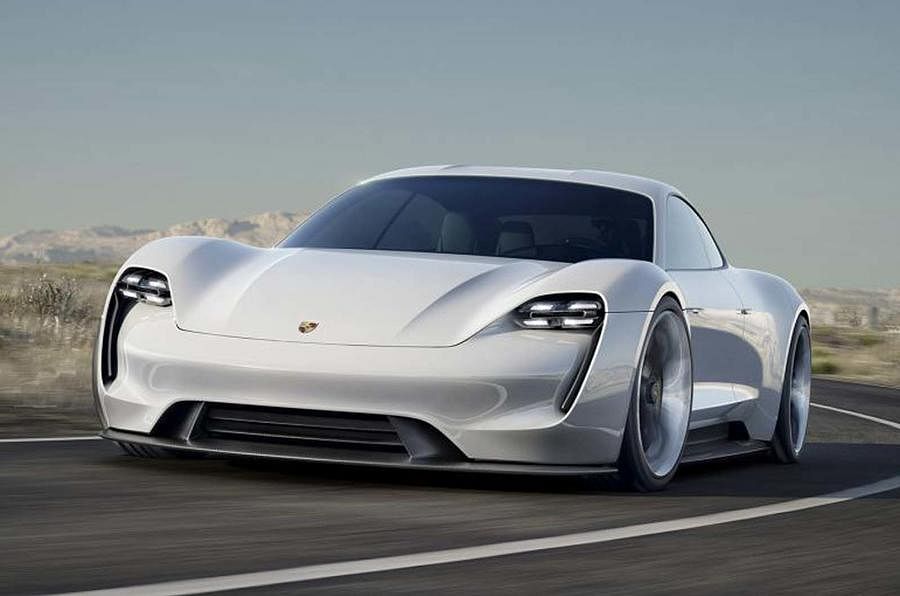Porsche plans electric SUV and Tesla Roadster-rivalling sports car
Alongside its upcoming Taycan saloon, Porsche is planning a plethora of zero-emission models by 2022.
Porsche is planning a battery-electric SUV and all-electric Boxster/Cayman sports car, plus a Taycan Targa, for launch by 2022 as part of its investment in electrification.
Porsche finance director Lutz Meschke revealed the plan for a battery SUV and sports car at an event in Germany last week. "You can expect a SUV BEV [battery-electric vehicle] by 2022 at the latest,” he told journalists, without elaborating further.
Meschke also told journalists that “the Boxster and Cayman could be suitable for electrification”.
Departed Volkswagen Group CEO Matthias Müller – previously Porsche’s boss – committed every group brand to having an electrified version of every model by 2023, and Porsche was no exception.
Meschke referred to the electric utility vehicle as a “big SUV”, which would indicate a Cayenne-sized car, but the Cayenne is just a year old and not due for replacement until 2024/25. It would make a natural rival for the Tesla Model X.
To get an electric SUV to market more rapidly, Porsche is likely to focus on the replacement for the mid-size Macan – which currently shares its platform with Audi’s Q5 – as it is due for replacement around 2021. However, there are at least three other possibilities: a variant of Audi’s new E-tron SUV, a re-engineered Cayenne, or a ground-up new Porsche all-electric SUV.
Porsche is moving fast in the direction of BEVs post-Dieselgate and the new Taycan four-door has been in development for four years and will be launched in late 2019.

This month, Porsche announced that it will drop diesel from its engine line-up. This will especially affect the Macan, one of its bestselling vehicles and sold with a rich mix of diesel engines.
Porsche is already working on a new, all-electric platform, called the PPE, jointly with Audi for a next generation of electric vehicles. The PPE is all-new, but includes learning from the J1 underpinning that’s the basis for the new four-door Taycan BEV, due on sale “by the end of 2019”.
The Taycan will become a family of models with further strong hints that the Cross Turismo, shown as a concept at Geneva this year, has a production future. “The Taycan derivatives have already been showcased,” said Meschke.
It has also emerged that the Zuffenhausen plant where the Taycan will be built is preparing for a Targa version, for launch in 2020/21. Details are scarce, but the Taycan Targa is most likely to feature a large glazed opening that slides down to the rear hatch area. The J1 underpinning could readily be adapted with a short wheelbase and two-door body as the basis of a new compact Porsche sports car. However, such a mod would reduce battery size, range and performance.
Preparing for more electric models after the Taycan, the new PPE architecture is in development in parallel with the Taycan and could be ready for market in 2022, when Porsche says its BEV SUV will be on sale.
It is unclear if the PPE platform is sufficiently flexible to underpin multiple powertrain layouts and firewall heights, but Porsche has already built an electric Boxster E prototype. A packaging prototype, it was also touted as a possible rival for the Tesla Roadster. But that was seven years ago, an age in electric car development.
The Boxster E had componentry borrowed from VW’s Golf blue-e motion and a 121bhp electric motor fed by a 340-cell lithium ion battery pack, all packaged in the space vacated by the flat-six combustion engine.
Porsche engineers learned a lot from that car, including concerns that the weight of the battery powertrain would affect performance and handling, the latter because the weight raised the centre of gravity. One told Autocar UK last year that “fully electrified sports cars would work well for longitudinal acceleration, but the weight disadvantage is in the handling”. Whether a future 911 will use solely battery power is also up for debate.
Meschke confirmed that the next 911, in its new 992 guise and due on sale later this year, will include a hybrid version.
The 911 hybrid won’t be available at launch, but is pencilled in to the plan as part of the new model electrification onslaught by 2022 – to fulfil the group strategic target of every model with an electrified version by 2023.
Porsche engineers have previously told Autocar UK that the packaging issues of a pure battery electric drivetrain were incompatible with the 911 as a fine handling sports car with everyday usable 2+2 seating.
Last year, an engineer told Autocar UK that next-generation solid-state batteries, which are lighter and predicted to be able to be shaped to reduce package space, might be the required breakthrough to make a 911 BEV a reality. However, solid-state technology may be a decade from production.
RELATED ARTICLES
Isuzu unveils D-Max EV at 2025 Commercial Vehicle Show
Revealed at the 2025 Commercial Vehicle Show in Birmingham, the Isuzu -Max EV is the first fully electric commercial pic...
Hyundai unveils next−gen highly efficient hybrid system
The next-gen hybrid system is claimed to offer 45% better fuel efficiency and 19% more power compared with ICE powertrai...
Horse Powertrain reveals hybrid conversion for electric cars
Engine-making joint venture of Geely and the Renault Group announces new hybrid powertrain that fits into the same space...






 16 Oct 2018
16 Oct 2018
 5765 Views
5765 Views





 Autocar Professional Bureau
Autocar Professional Bureau




